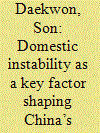| Srl | Item |
| 1 |
ID:
148177


|
|
|
|
|
| Summary/Abstract |
The outbreak of the Korean War and the announcement of dispatching the 7th fleet to the Taiwan Strait seriously shook the political and economic foundations of the newly established Chinese Communist Party (CCP) regime. Mao Zedong, taking advantage of North Korea’s ascendancy at the beginning of the war, wanted to dispatch troops to assist in a quick North Korean victory. That desire, however, was not realized due to opposition of Stalin.
With the landing of United Nation (UN) forces at Incheon in September 1950, China’s determination for intervention gradually weakened, informing Stalin and Kim Il-sung that it would not intervene even on being invited. Under a security threat and Stalin’s pressure, Mao decided on October 5 to send troops, but that decision was cancelled on October 12 due to Stalin’s refusal to provide air cover and weaponry promptly. On the following day, however, Mao again decided to send troops after Peng Dehuai argued that US forces should stop their northward advance at the Pyongyang-Wonsan line. Securing the northern part of North Korea without bloodshed, thus extending China’s defensive line was a crucial factor in the final calculation. In conclusion, China’s Korean War intervention was made based on practical considerations, with maximum profit at minimum cost.
|
|
|
|
|
|
|
|
|
|
|
|
|
|
|
|
| 2 |
ID:
171080


|
|
|
|
|
| Summary/Abstract |
This study explores the domestic determinants of China’s intervention in the Korean War. Since the war, scholars have produced a large number of studies on the motivations behind China’s intervention in the war. These previous studies paid scant attention to domestic aspects, all of them assuming, albeit implicitly, that Party leaders could readily harness all available domestic resources and devote them to their political ends and that the public was willing to sacrifice their material resources and lives in order to satisfy the leaders’ political goals. By contrast, this study, based on extensive newly unearthed archival documents, argues that very unfavorable domestic circumstances helped shape the CCP’s strategy both before and after the outbreak of the Korean War. The domestic challenges not only provided the rationale for the CCP’s opposition to Kim Il-Sung’s Korean War plan before June 1950 but also gave an internal impetus for China’s vacillation in decision making and affected Mao’s final proactive decision to enter the war in October 1950.
|
|
|
|
|
|
|
|
|
|
|
|
|
|
|
|